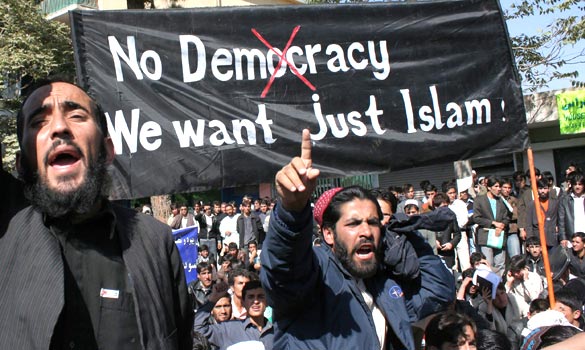

07/31/2011
Here’s an update on the Middle East’s “Arab Spring” which was much celebrated in the liberal press as an example of the improvability of human societies, even the backward ones. Peaceful protest could lead to positive political change. Plus, if real democracy were offered in Egypt and beyond, then the great majority would embrace it and forget about Islamic extremism. Kumbaya in a turban.
Recent events in Cairo are unhopeful in that regard, however. The photo below is from another rally but the sentiments are the same ones expressed in Tahrir Square on Friday, where at least one Islamist declared, “We are all Osama bin Laden” (viewable in the video below).

Even Al Jazeera noticed a sharp difference of values between Islamists and democratically inclined Egyptians: “Visions collide in a sweltering Tahrir Square.”
Egyptian ‘unity’ rally highlights split within nation, Los Angeles Times, July 29, 2011
Reporting from Cairo — A huge rally Friday meant to symbolize Egyptian unity highlighted instead the deepening splits between secularist and Islamist parties over the direction of a nation convulsed in recent weeks by protests and fears that the revolution for democracy has sputtered.
The demonstration in Cairo’s Tahrir Square reaffirmed the power of the Muslim Brotherhood and other Islamist organizations that amassed tens of thousands of supporters. It was a stark display that signaled battles certain to unfold in coming months over the influence of Islamic law on Egypt’s new constitution.
Secularist parties have pressured the ruling military council to draft guidelines to govern the writing of a constitution. The Brotherhood has criticized the move as an attempt to circumvent the new Parliament, which Islamists are expected to control, giving them power to pass a constitution weighted in Sharia law.
“The people want an Islamic state,” Islamists chanted while outnumbered secular demonstrators watched from the sidelines in a square streaked with religious banners and echoing with sound of voices from loudspeakers.
“I’m really scared of the potential of an Islamic state in Egypt. Islamists like the Muslim Brotherhood don’t allow any democracy within their movement,” said Amira Badr, a 27-year-old administrator. “What will they do to a whole nation in the name of religion? I’m a devout Muslim, but I separate religion from politics.”
The competing agendas reveal the passions and dangers the Arab’s world’s most populous country faces as it navigates away from the era of toppled President Hosni Mubarak and toward defining Egypt’s character for coming generations. The drama is part of a struggle between pro-democracy groups and Islamic organizations seeking to capitalize on rebellions sweeping the region.
The demonstration was to be a day of putting differences aside so Islamists and secularists could protest together in urging the military council to enact reforms and bring officials from Mubarak’s regime to justice. That unity, however, was overwhelmed by calls from moderate and ultra-conservative Muslims to instill the Koran into the laws of the land.
“Islamic, Islamic, we don’t want it secular,” shouted demonstrators.
Secular and youth parties worry that such sentiment would shape a constitution that doesn’t protect women and non-Muslims. This concern has grown in recent months as ultra-conservative Islamist groups such as Gamma al Islamiya, which carried out terror attacks in the 1980s and ’90s, have become politically active.
“I’m here calling for Sharia law because I believe it’s the best system to rule and guarantee freedoms for Muslims and non-Muslims,” said Mohamed Ali Wafi, a teacher. “Christians here will be safer under Sharia. But the problem is that many people who don’t fully understand Sharia are against it.”